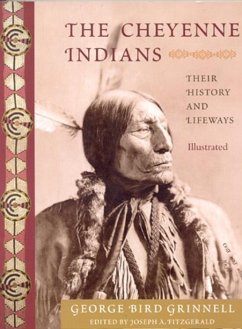
History of the Ottawa and Chippewa Indians of Michigan (eBook, ePUB)
A Grammar of Their Language, and Personal and Family History of the Author
Versandkostenfrei!
Sofort per Download lieferbar
1,99 €
inkl. MwSt.
Weitere Ausgaben:

PAYBACK Punkte
0 °P sammeln!
In "History of the Ottawa and Chippewa Indians of Michigan," Andrew J. Blackbird meticulously chronicles the rich heritage, customs, and challenges faced by the Ottawa and Chippewa tribes. The work showcases a blend of narrative history and ethnographic account, reflecting Blackbird's keen insights into Native American life during a period of intense cultural upheaval. The book is notably contextualized within the larger frameworks of post-colonial studies and Indigenous rights, as it draws attention to the systemic injustices experienced by the tribes in Michigan. Blackbird's work serves not ...
In "History of the Ottawa and Chippewa Indians of Michigan," Andrew J. Blackbird meticulously chronicles the rich heritage, customs, and challenges faced by the Ottawa and Chippewa tribes. The work showcases a blend of narrative history and ethnographic account, reflecting Blackbird's keen insights into Native American life during a period of intense cultural upheaval. The book is notably contextualized within the larger frameworks of post-colonial studies and Indigenous rights, as it draws attention to the systemic injustices experienced by the tribes in Michigan. Blackbird's work serves not only as a historical account but also as a powerful reclamation of Indigenous narrative and identity, expressed through a vivid and detailed literary style that engages both scholarly and general audiences. Andrew J. Blackbird, a prominent figure among the Ottawa tribe, draws from his personal heritage and social experiences in this compelling narrative. Born in 1830, Blackbird was deeply immersed in the cultural traditions of his people, which shaped his understanding and portrayal of their history. His commitment to preserving Indigenous narratives stems from both a familial duty and a desire to correct historical inaccuracies that have long marginalized Native perspectives, positioning him as an essential voice in American Indian literature. This vital work is recommended for readers seeking a profound understanding of Native American history, culture, and resilience. Blackbird's eloquent storytelling and deep-rooted insights offer valuable lessons in empathy and awareness, making it a crucial addition to both academic libraries and personal collections. Readers will gain not only historical knowledge but also a richer appreciation for the complexities of Native American identity in contemporary society.
Dieser Download kann aus rechtlichen Gründen nur mit Rechnungsadresse in A, B, BG, CY, CZ, D, DK, EW, E, FIN, F, GR, H, IRL, I, LT, L, LR, M, NL, PL, P, R, S, SLO, SK ausgeliefert werden.













